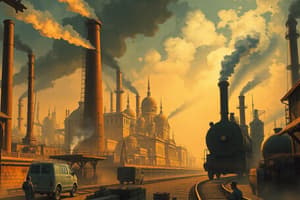Podcast
Questions and Answers
What is the Industrial Revolution?
What is the Industrial Revolution?
The period of transition from a largely rural and agrarian economy to an industrial and urban one, beginning around 1760 and lasting until the mid-19th century.
What is the historical significance of the Industrial Revolution?
What is the historical significance of the Industrial Revolution?
It had a profound impact on human history, leading to urbanization and significant changes in manufacturing, transportation, and communication.
What impact did the Industrial Revolution have on urbanization?
What impact did the Industrial Revolution have on urbanization?
People began to move from rural areas to cities in search of employment opportunities in factories, leading to the growth of urban populations.
Where did the Industrial Revolution primarily occur?
Where did the Industrial Revolution primarily occur?
What period marked the beginning of the Industrial Revolution?
What period marked the beginning of the Industrial Revolution?
What were some key developments during the Industrial Revolution?
What were some key developments during the Industrial Revolution?
What significant social changes were brought about by the Industrial Revolution?
What significant social changes were brought about by the Industrial Revolution?
Who revolutionized the manufacturing process with the invention of the steam engine in 1769?
Who revolutionized the manufacturing process with the invention of the steam engine in 1769?
What negative consequences of the Industrial Revolution were highlighted by the Luddites?
What negative consequences of the Industrial Revolution were highlighted by the Luddites?
How did the introduction of new manufacturing technologies and processes impact productivity during the Industrial Revolution?
How did the introduction of new manufacturing technologies and processes impact productivity during the Industrial Revolution?
What measures were taken to regulate working hours and improve workers' rights as a response to harsh working conditions in factories?
What measures were taken to regulate working hours and improve workers' rights as a response to harsh working conditions in factories?
How did the expansion of trade and the growth of industries contribute to nations' overall economic growth during the Industrial Revolution?
How did the expansion of trade and the growth of industries contribute to nations' overall economic growth during the Industrial Revolution?
What were some of the key developments that continue to shape modern societies today, according to the conclusion of the text?
What were some of the key developments that continue to shape modern societies today, according to the conclusion of the text?
In what year did the Luddites destroy textile machinery to draw attention to the negative consequences of the Industrial Revolution?
In what year did the Luddites destroy textile machinery to draw attention to the negative consequences of the Industrial Revolution?
What were some of the notable contributions of James Watt to the Industrial Revolution?
What were some of the notable contributions of James Watt to the Industrial Revolution?
What pivotal period in human history is characterized by significant changes in manufacturing, transportation, and communication?
What pivotal period in human history is characterized by significant changes in manufacturing, transportation, and communication?
Flashcards are hidden until you start studying
Study Notes
The Idea of History: Exploring the Industrial Revolution
History, as a discipline, is the study of past events and their impact on the present. It helps us understand the origins of our societies, the development of cultures, and the evolution of ideas. One of the most significant periods in history is the Industrial Revolution, which marked a turning point in the development of human societies. In this article, we will explore the key ideas of history related to the Industrial Revolution.
Defining the Industrial Revolution
The Industrial Revolution, defined as the period of transition from a largely rural and agrarian economy to an industrial and urban one, began around 1760 and lasted until the mid-19th century. This transformation occurred primarily in Western Europe and the United States and brought about significant changes in manufacturing, transportation, and communication.
Historical Significance of the Industrial Revolution
The Industrial Revolution had a profound impact on human history. Some of the key developments during this period include:
- Urbanization: People began to move from rural areas to cities in search of employment opportunities in factories, leading to the growth of urban populations.
- Increased productivity: The introduction of new manufacturing technologies and processes led to a significant increase in productivity, allowing for the mass production of goods.
- Economic growth: The expansion of trade and the growth of industries contributed to the overall economic growth of nations.
- Social change: The Industrial Revolution brought about significant social changes, including the rise of the middle class and the emergence of new social problems such as poverty and urbanization.
Key Figures and Events of the Industrial Revolution
Several key figures and events contributed to the development of the Industrial Revolution. Some of the most notable include:
- James Watt: Scottish inventor James Watt's invention of the steam engine in 1769 revolutionized the manufacturing process, leading to a significant increase in productivity.
- The Luddites: Although not a positive force for the Industrial Revolution, the Luddites, a group of British textile artisans who destroyed textile machinery in the late 18th and early 19th centuries, drew attention to the negative consequences of the Industrial Revolution.
- Factory acts: As the working conditions in factories became increasingly harsh, various factory acts were passed to regulate working hours and improve workers' rights.
In conclusion, the Industrial Revolution was a pivotal period in human history, marked by significant changes in manufacturing, transportation, and communication. The ideas and developments of this period continue to shape our societies today. By studying the Industrial Revolution, we can gain a deeper understanding of the origins of our modern industrialized world and the challenges and opportunities it presents.
Studying That Suits You
Use AI to generate personalized quizzes and flashcards to suit your learning preferences.




